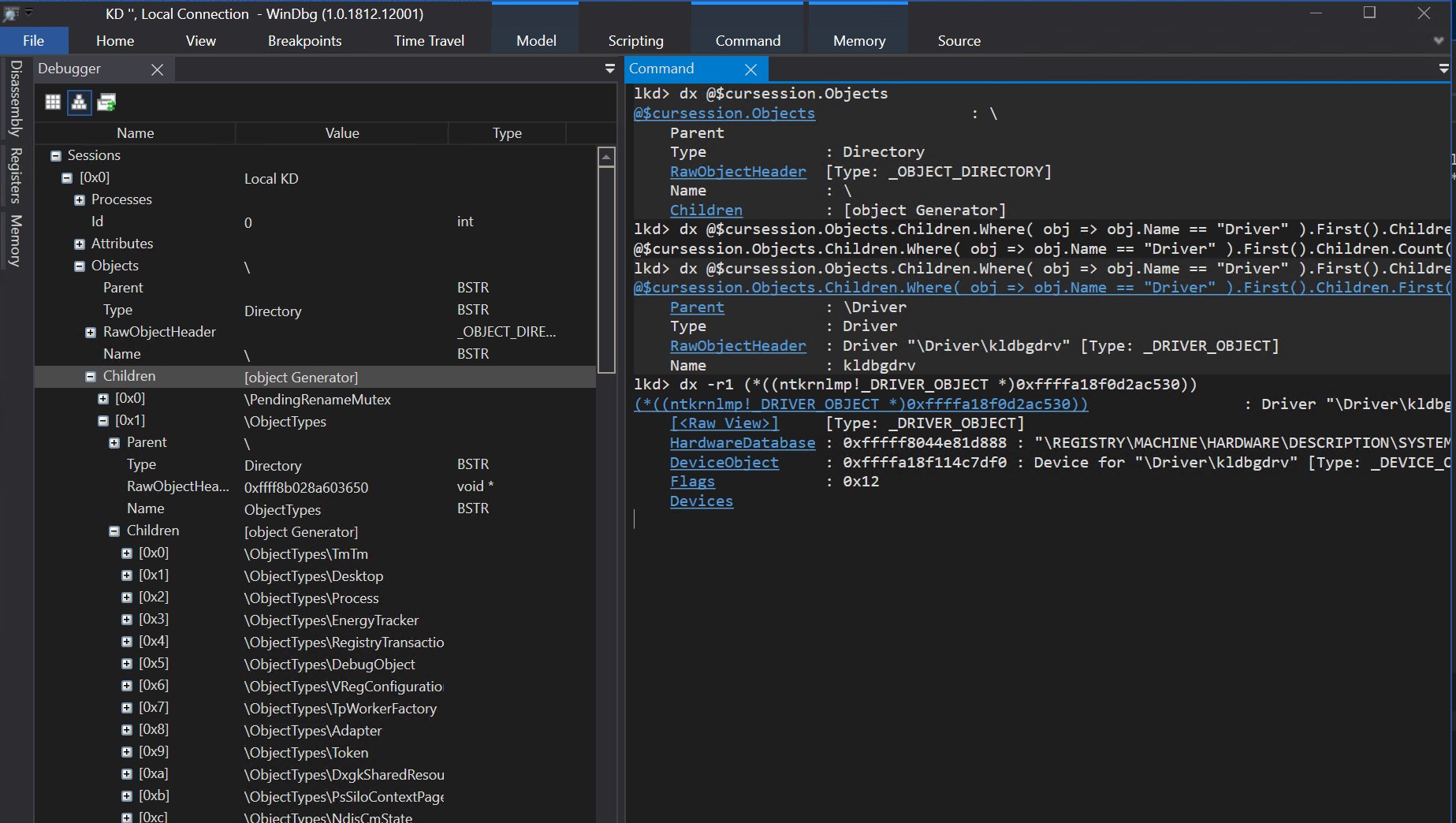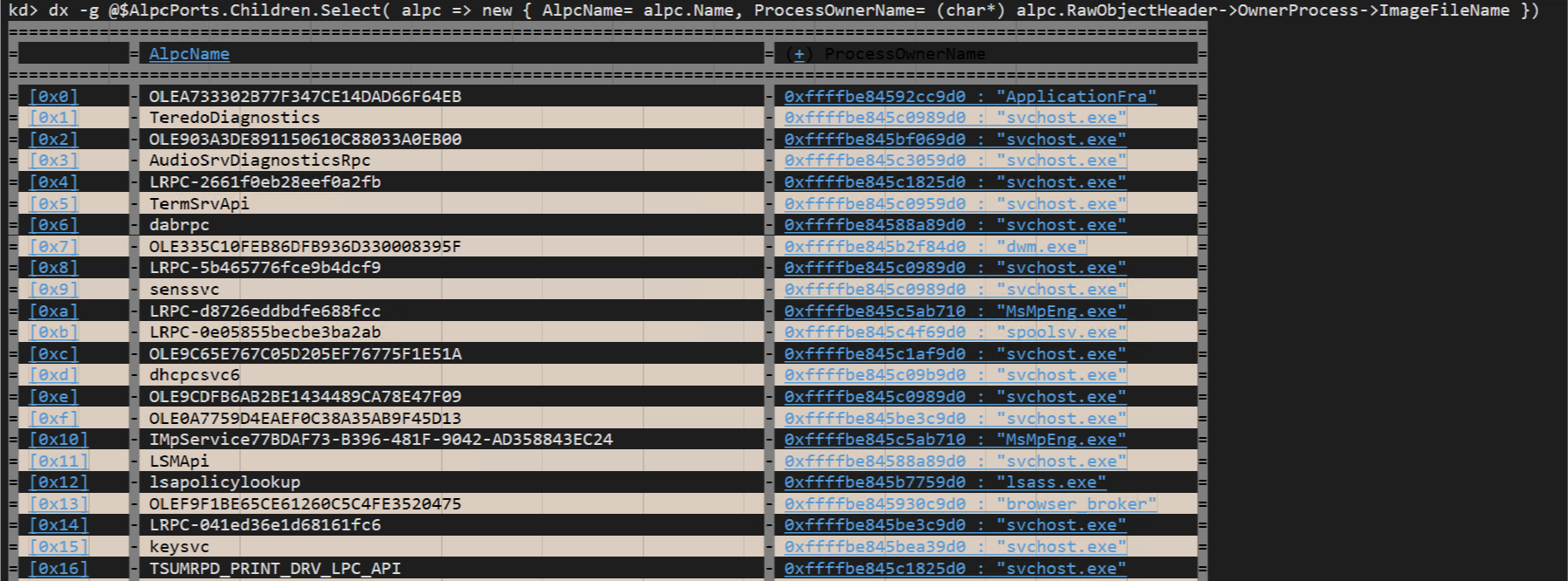Still on my way to learning of Windows kernel, I spend considerable amount of time on WinDbg Preview. I’ve been scripting my way to understand its components, the last in date was nt!ObpRootDirectoryObject. This pointer is well documented, especially @ivanlef0u ’s article about it (french) is a good place to start.
The Status Quo
Tools like WinObj or WinObjEx64 are crazy useful. Since they are userland specific they can rely most on already existing ntdll functions to dynamically query to object directory, such as:
NTSTATUS NtOpenDirectoryObject(
_Out_ PHANDLE DirectoryHandle,
_In_ ACCESS_MASK DesiredAccess,
_In_ POBJECT_ATTRIBUTES ObjectAttributes);
NTSTATUS NtQueryDirectoryObject(
_In_ HANDLE DirectoryHandle,
_Out_writes_bytes_opt_(Length) PVOID Buffer,
_In_ ULONG Length,
_In_ BOOLEAN ReturnSingleEntry,
_In_ BOOLEAN RestartScan,
_Inout_ PULONG Context,
_Out_opt_ PULONG ReturnLength);
Those tools are excellent, I use them big time but I was curious if it was possible to extend the data model to expose object tree in a similar fashion. Because the problem in KM (as we can see in Ivan’s post) is that the structures hold a lot of pointers, LIST_ENTRYs and other goodies that must be dereferenced manually which turns out to be a tedious task. Also that approach prevents from easily querying the directory object.
But hold your breath, here comes the Debugger Data Model…
Extending WinDbg data model to expose the directory objects
With the help of Alex Ionescu pointing out my shortcomings - but always for my benefit -, I ended up with writing ObjectExplorer.js, a surprisingly short JS scripts for WinDbg, which parses and exposes in a structured way the content of nt!ObpRootDirectoryObject.

Not only it’s all click-friendly when I’m feeling it’s too complicated to type on a keyboard, but the absolute awesome thing is the total integration with LINQ, so you can actually search those objects programmatically (which is impossible with WinObj for instance). Say you want to enumerate the nt!_OBJECT_TYPE keys of all the ObjectTypes on your version of Windows, well…
lkd> dx -g -r1 @$cursession.Objects.Children.Where( obj => obj.Name == "ObjectTypes" ).First().Children.Select(o => new { Name = o.RawObjectHeader.Name, Key = (char*)&o.RawObjectHeader.Key})
which produces something like:
==============================================================================================
= = (+) Name = (+) Key =
==============================================================================================
= [0x0] - "TmTm" - 0xffffbe8458913b90 : "TmTm" =
= [0x1] - "Desktop" - 0xffffbe8458903fe0 : "Desk" =
= [0x2] - "Process" - 0xffffbe8458880480 : "Proc???" =
= [0x3] - "EnergyTracker" - 0xffffbe8458998fe0 : "Ener" =
= [0x4] - "RegistryTransaction" - 0xffffbe845899efe0 : "Regi" =
= [0x5] - "DebugObject" - 0xffffbe8458863a10 : "Debu???" =
= [0x6] - "VRegConfigurationContext" - 0xffffbe8459f43fe0 : "VReg" =
= [0x7] - "TpWorkerFactory" - 0xffffbe845887ba70 : "TpWo???" =
[...]
Or enumerate all processes owning an ALPC port object from the \RPC Control directory can be seen as easily as
lkd> dx -r0 @$AlpcPorts = @$cursession.Objects.Children.Where( obj => obj.Name == "RPC Control" ).First().Children.Where( rpc => rpc.Type == "ALPC Port")
lkd> dx -g @$AlpcPorts.Select( alpc => new { AlpcName= alpc.Name, ProcessOwnerName= (char*) alpc.Object.OwnerProcess->ImageFileName })
and we get:

You get the gist. Pretty cool, right?
Although it’s already fully functional, ObjectExplorer.js script will be improved gradually. If you have feedbacks or suggestions, I’d be happy to hear about them.
Cheers ☕️